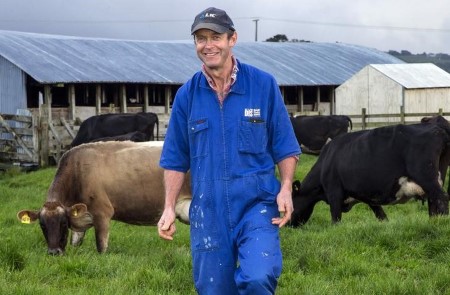New Zealand's booming tourism industry is emerging as a cornerstone of an economy hit by declining dairy exports, but the hordes descending on silver screen locations such as Hobbiton are stretching the small island nation's resources.
While the growing numbers of visitors bring in much needed revenue, there is increasing public criticism as campers litter parts of the pristine countryside and locals blame foreign drivers for causing carnage on the roads.
"The biggest problem is the mess they leave behind," said Chris Choat, spokesman for Tasman District Council in the South Island, where "freedom campers", who park overnight in areas that have no formal facilities, have riled residents as they use bushes for toilets.
Until recently, dairy was the backbone of the island nation's economy, representing around 25 percent of exports. But dairy prices have dropped sharply since scaling record highs in 2013, due to China's economic slowdown and global oversupply.
International tourists, meanwhile, hit a record-breaking 3.09 million in the year to the end of November.
The private-sector Tourism Industry Association (TIA) estimates the value of international tourism reached NZ$13.5 billion ($8.85 billion) in the year to September, overtaking the $NZ13 billion the dairy sector earned in the same period.
The trend is not expected to slow down, given the weak New Zealand dollar and increasing airline capacity.
"We are having a boom period at the moment and we expect to maintain strong levels of growth," said TIA Chief Executive Chris Roberts.
BEER, HOBBITS At the Hobbiton Movie Set Tours in Matamata on the North Island, a key filming location in the Lord of the Rings and Hobbit movies, business is on track to be up 40 percent in the current year to March, with around 2,500 people currently visiting daily.
The Green Dragon Inn is serving around 1,000 litres of specially brewed beer a day, said General Manager Russell Alexander, and drive-in visitors often cannot get a spot as tours are booked out in advance online.
In Queenstown, an adventure hotspot on the South Island, hotel accommodation is in short supply, in particular over peak times such as the Christmas and the upcoming Chinese New Year holiday. Venues such as the Copthorne Hotel and Resort Queenstown Lakefront have no vacancies over the Chinese holiday, which kicks off in earnest on Feb. 7.
Meanwhile, accusations of dangerous driving by tourists are causing friction.
A video showing British YouTuber Louis Cole being pulled over for speeding has drawn wide coverage, and criticism, in New Zealand.
In the video a police officer can be heard telling Cole, who has 1.6 million subscribers, that his licence could be suspended for travelling at 141 km/h, well above the 100 km/h limit. "To be fair, I don't know what the speed limit is in New Zealand," says Cole later in the footage. "This is why so many New Zealanders get killed by tourists and our road toll is so high," said one commenter on the video, which has been viewed more than 152,000 times.
In parts of New Zealand's South Island popular with tourists crashes involving an overseas driver make up a quarter or more of all road accidents, according to statistics from the Department of Transport.
The government's response has been to invest millions in safety materials, including apps, web sites and videos for incoming tourists.
Road safety campaigner Clive Matthew-Wilson believes it should go further, calling for drivers arriving on long-haul flights to be prevented from renting vehicles for 24 hours and made to take a simple computerised competency test.
"Many of these high profile tourist deaths are being widely reported overseas," he said. "Ultimately, they are likely to damage New Zealand's reputation internationally." ($1 = 1.5260 New Zealand dollars)
- Forums
- NZX - General
- News: As dairy declines, New Zealand milks tourism boom











